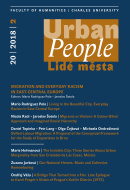Skilled Labour Migration
A Proposal of the Conceptual Framework for the Study of Expatriates in Brno
DOI:
https://doi.org/10.14712/12128112.3288Klíčová slova:
skilled migration, expatriate, conceptualisation of labour migration, adaptation of expatriates, Indian expatriatesAbstrakt
Expatriates are one type of international skilled labour migration. This text will focus on conceptualising and defining categories of expatriates for research purposes. A closer examination requires a definition that reflects theoretical definitions, but also takes into account the local delimitation and even the self-concept of the immigrants themselves. In this text, these perspectives are laid out side by side. Our conceptualisation is comprised of four basic attributes that refer to the centre of personal life (life strategies), the temporary aspect of residence, professional or working skills, and the motivation to migrate. At the local level, the Brno Expat Centre (BEC) operating in the South Moravian Region, is monopolistically involved in the definition of expatriates on a practical scale. The processes of globalisationand trans-nationalisation have led to the diversification of forms of labour migration, which, together with interdisciplinarity, has resulted in a considerable ambiguity of terms and concepts. Thus, for research purposes, one must bear in mind that despite the uniform designation, we are dealing with a very diversified phenomenon. If expatriates are distinguished from skilled migrants, we usually emphasise the undefined length of their stay as opposed to permanent residence and the very important self-concept of expatriates. Brno has become one of the most important places of concentration of expats in the Czech Republic. From the pre-research of the Indian expats case, it shows that the different transnational strategies are very diverse. For further research, it is important to explore the social and demographic characteristics of expats, and we need qualitative research that focuses on the structural conditions of the life of expats and the self-evaluation of expats themselves, considering ethno-cultural factors and gender. Their family members also cannot be ignored.
Stahování
Publikováno
Jak citovat
Číslo
Sekce
Licence

Tato práce je licencována pod Mezinárodní licencí Creative Commons Attribution-NonCommercial-NoDerivatives 4.0.


